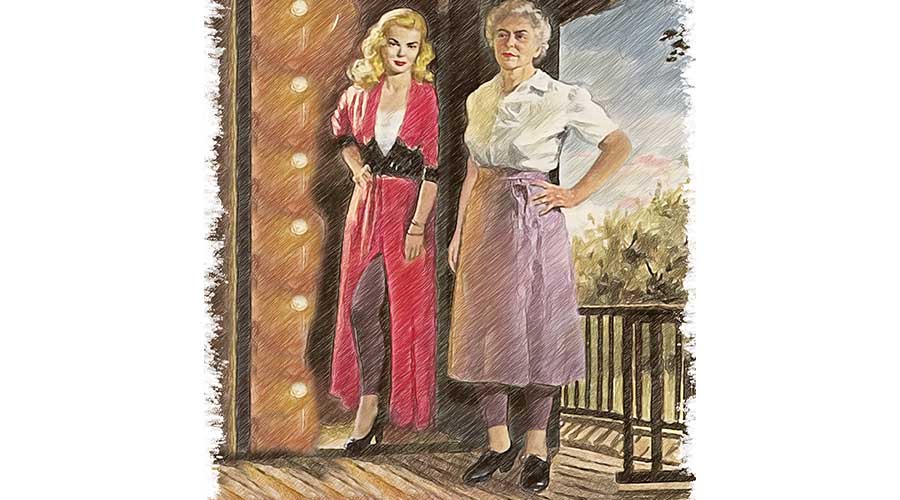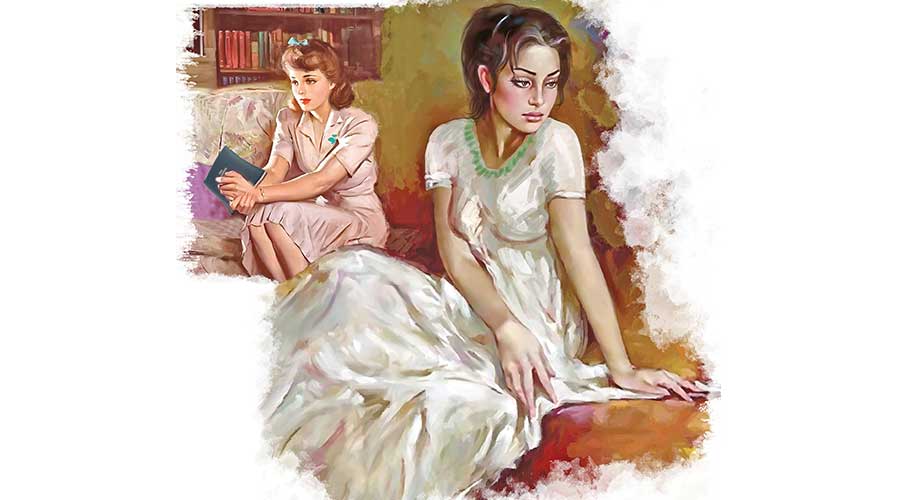THE ORCHARD ON FIRE
- 20 Apr - 26 Apr, 2024

I don't want father to know that, for I hope it never'll come into his head he's so helpless; but I should be worried to death to have him left alone. "That's very good of her, isn't it?" he said "You trust her, don't you?" "Trust Phoebe! Well, I guess I do! I've known her ever since she went to Number Five, and now she's keeping the school herself. She's a real noble girl!" "Tell me more!" said the doctor, warmly. "I want to hear it all. You're so new to me here in Tiverton! I want to get acquainted." Miss Dorcas suddenly felt as if she had been talking a great deal, and an overwhelming shyness fell upon her. "There isn't much to tell," she hesitated. "I don't know's anything’s happened to me for years, till father had his ill-turn in the spring, and we called you in. He don't seem to realise his sickness was anything much. I've told the neighbors not to dwell on it when they're with him. Phoebe won't; she's got some sense." "Has she?" said the doctor, still eagerly. "I'm glad of that, for your sake!" He rose to go, but stood a moment near the steps, dallying with a reaching branch of Jessamine; it seemed persuading him to stay. He had always a cheery manner, but to-night it was brightened by a dash of something warm and reckless.
Dorcas was alive to the rapt contagion, and her own blood thrilled. She felt young. "Well!" said he, "well, Miss Dorcas!" He took a step, and then turned back. "Well, Miss Dorcas," he said again, with a laugh, "perhaps you'd like to gather in one more church-goer. If I have time tomorrow, I'll drop in to your service, and then I'll come round here, and tell your father I went." Dorcas rose impulsively. She could have stretched out her hands to him, in the warmth of her gratitude. "Oh, if you would! Oh, how pleased he'd be!" "All right!" Now he turned away with decision. "Thank you, Miss Dorcas, for staying out. It's a beautiful evening. I never knew such a June. Good- night!" He strode down the walk, and gave a quick word to his horse, who responded in whinnying welcome.
An instant's delay, another word, and they were gone. Dorcas stood listening to the scatter of hoofs down the dusty road and over the hollow ledge. She sank back on the sill, and, step by step, tried to retrace the lovely arabesque the hour had made. At last, she had some groping sense of the full beauty of living, when friendship says to its mate, "Tell me about yourself!" and the frozen fountain wells out, every drop cheered and warmed, as it falls, in the sunshine of sympathy. She saw in him that perfection of life lying in strength, which he undoubtedly had, and beauty, of which he had little or much according as one chose to think well of him. To her aching sense, he was a very perfect creature, gifted with, infinite capacities for help and comfort. But the footfalls ceased, and the garden darkened by delicate yet swift degrees; a cloud had gone over the moon, fleecy, silver-edged, but still a cloud.
The waning of the light seemed to her significant; she feared lest some bitter change might befall the moment; and went in, bolting the door behind her. Once within her own little bedroom, she loosened her hair, and moved about aimlessly, for a time, careless of sleep, because it seemed so far. Then a sudden resolve nerved her, and she stole back again to the front door, and opened it. The night was blossoming there, glowing now, abundant. It was so rich, so full! The moonlight here, and star upon star above, hidden not by clouds but by the light! Need she waste this one night out of all her unregarded life? She stepped forth among the flower-beds, stooping, in a passionate fervor, to the blossoms she could reach; but, coming back to the southernwood, she took it in her arms. She laid her face upon it, and crushed the soft leaves against her cheeks. It made all the world smell of its own balm and dew.

The fragrance and beauty of the time passed into her soul, and awakened corners there all unused to such sweet incense. She could not have found words for the passion that possessed her, though she hugged it to her heart like another self; but it was elemental, springing from founts deeper than those of life and death. God made it, and, like all His making, it was divine. She sat there, the southernwood still gathered into her arms, and at last emotion stilled itself, and passed into thought; a wild temptation rose, and with its first whisper drove a hot flush into her cheeks, and branded it there. Love! She had never named the name in its first natal significance. She had scarcely read it; for romance, even in books, had passed her by.
But love! She knew it as the insect knows how to spread his new sun-dried wings in the air for which he was creating. Sitting there, in a happy drowse, she thought it all out. She was old, plain, unsought; the man she exalted was the flower of his kind. He would never look on her as if she might touch the hem of wifehood's mantle; so there would be no shame in choosing him. Just to herself, she might name the Great Name. He would not know. Only her own soul would know, and God who gave it, and sent it forth fitted with delicate, reaching tentacles to touch the rock set there to wound them. She began to feel blindly that God was not alone the keeper of eternal Sabbaths, but the germinant heat at the heart of the world. If she were a young girl, like Phoebe, there would be shame. Even a thought of him would be a stretching forth her hand to touch him, saying, "Look at me! I am here!" but for her it was quite different. It would be like a dream, some grandmother dreamed in the sun, of rosy youth and the things that never came to pass.
No one would be harmed, and the sleeper would have garnered one hour's joy before she took up her march again on the lonesomest road, although it leads us, home! Thus she thought, half sleeping, until the night-dews clung in drops upon her hair; then she went in to bed, still wrapped about with the drapery of her dreams. Next morning, when Dorcas carried in her father's breakfast, she walked with a springing step, and spoke in a voice so full and fresh it made her newly glad. "It's a nice day, father! There'll be lots of folks out to meeting." "That's a good girl!" This was his commendation, from hour to hour; it made up the litany of his gratitude for what she had been to him. "But I dunno's I feel quite up to preachin' to-day, Dorcas!" "That'll be all right, father. We'll get somebody." "You bring me out my sermon-box after breakfast, an' I'll pick out one," said he, happily. "Deacon Tolman can read it." But, alas! Deacon Tolman had been dead this many a year! A little later, the parson sat up in bed, shuffling his manuscript about with nervous hands, and Dorcas, in the kitchen, stood washing her breakfast dishes. That eager interest in living still possessed her.

She began humming, in a timid monotone. Her voice had the clearness of truth, with little sweetness; and she was too conscious of its inadequacy to use it in public, save under the compelling force of conscience. Hitherto, she had only sung in Sunday-school, moved, as in everything, by the pathetic desire of "doing her part;" but this morning seemed to her one for lifting the voice, though not in Sunday phrasing. After a little thought, she began thinly and sweetly,"Early one morning, just as the sun was rising, I heard a maid sing in the valley below: 'O doesn’t deceive me! O never leaves me how could you use a poor maiden so?'" A gruff voice from the, doorway broke harshly in upon a measure. "Yes! Yes! Well! Well! Tunin' up a larrady, ain't ye?" Dorcas knew who it was, without turning round,--a dark, squat woman, and broad all over; broad in the hips, the waist, the face, and stamped with the race-mark of high cheekbones. Her thick, straight black hair was cut "tin-basin style;" she wore men's boots, and her petticoats were nearly up to her knees. "Good morning, Nancy!" called Dorcas, blithely, wringing out her dishcloth. "Come right in, and sit down." Nance Pete (in other words, Nancy the wife of Pete, whose surname was unknown) clumped into the room, and took a chair by the hearth. She drew forth a short black pipe, looked into it discontentedly, and then sat putting her thumb in and out of the bowl. "You 'ain't got a mite o' terbacker about you? Hey what?" she asked.
Dorcas had many a time been shocked at the same demand. This morning, something humorous about it struck her, and she laughed. "You know I haven't, Nancy Pete! Did you mend that hole in your skirt, as I told you?" Nance laboriously drew a back breadth of her coarse plaid skirt round to the front, and displayed it, without a word. A three-cornered tear of the kind known as a barn-door had been treated by tying a white string well outside it, and gathering up the cloth, like a bag. Dorcas's sense of fitness forbade her to see anything humorous in so original a device. She stood before the woman in all the moral excellence of a censor fastidiously clad. "O Nancy Pete!" she exclaimed. "How could you?" Nance put her cold pipe in her mouth, and began sucking at the unresponsive stem. "You 'ain't got a bite of anything t' eat, have ye?" she asked, indifferently. Dorcas went to the pantry, and brought forth pie, doughnuts and cheese, and a dish of cold beans.
The coffee-pot was waiting on the stove. One would have said the visitor had been expected. Nance rose and tramped over to the table. But Dorcas stood firmly in the way. "No, Nancy, no! You wait a minute! Are you going to meeting to-day?" remarked Nance, addressing no one in particular. "Nancy, are you going to meeting?" "Whose seat be I goin' to set in?" inquired Nance, rebelliously, yet with a certain air of capitulation. "You can sit in mine. Haven't you sat there for the last five years? Now, Nancy, don't hinder me!" "Plague take it, then! I'll go!" At this expected climax, Dorcas stood aside, and allowed her visitor to serve herself with beans. When Nance's first hunger had been satisfied, she began a rambling monologue, of an accustomed sort to which Dorcas never listened. "I went down to peek into the Poorhouse winders, this mornin'. There they all sut, like rats in a trap. 'Got ye, 'ain't they?' says I.
Old Sal Flint she looked up, an' if there'd been a butcher-knife handy, I guess she'd ha' throwed it. 'It's that Injun!' says she to Mis' Giles. 'Don't you take any notice!' 'I dunno's I'm an Injun,' says I, 'I dunno how much Injun I be. I can't look so far back as that. I dunno's there's any more Injun in me than there is devil in you!' I say. An' then the overseer he come out, an' driv' me off. 'You won't git me in there,' say I to him, 'not so long's I've got my teeth to chaw sassafras, an' my claws to dig me a holler in the ground!' But when I come along, he passed me on the road an' old Sal Flint sut up by him on the seat, like a bump on a log. I guess he was carryin' her over to that Pope-o'-Rome meetin' they've got over to Sudleigh." Dorcas turned about, in anxious interest. "Oh, I wonder if he was!
COMMENTS